Country music, with its twangy guitars, heartfelt storytelling, and distinctive rhythms, occupies a cherished space in the hearts of millions. Its roots run deep, drawing inspiration from various musical traditions. However, a common misconception persists – that country music is the oldest musical genre. This article delves into the origins of country music, exploring its rich heritage while debunking the myth of its absolute age and highlighting the interconnectedness of various musical styles.
I. Beyond Borders: Tracing the Ancestry of Country Music
Country music, as we know it today, emerged in the early 20th century in the Southern United States, particularly in the Appalachian Mountains. However, its story doesn’t begin there. It’s a beautiful tapestry woven from threads of various musical traditions brought by immigrants from Europe and Africa, blending seamlessly with the musical expressions of the indigenous populations. Here’s a glimpse into some of these ancestral influences:
European Influences: Immigrants from Britain and Ireland brought ballads, fiddle tunes, and elements of folk music that laid the groundwork for the storytelling and melodic foundation of country music. Instruments like the fiddle and the banjo, with their European roots, became central to the genre’s sound.
African Influences: West African musical traditions, particularly those brought by enslaved people, played a significant role in shaping country music’s rhythmic sensibilities. The use of syncopation, call-and-response singing, and the bluesy pentatonic scale all have roots in African musical heritage.
Appalachian Folk Music: The mountainous regions of Appalachia served as a melting pot for these diverse musical influences. Isolated communities developed their own unique blend of European and African elements, creating a rich folk tradition that heavily influenced the birth of country music.
These ancestral influences came together in the early 20th century, giving rise to what we now recognize as country music. Early recordings from the 1920s captured the essence of this nascent genre, featuring elements of string band music, blues, and old-time fiddle tunes.
II. A World Stage: Exploring Older Musical Traditions
While country music has a rich and vibrant history, it’s important to acknowledge that numerous musical traditions predate it. Here’s a look at some of the oldest musical styles from around the world:
Indigenous Music: Across the globe, various indigenous cultures have developed rich musical traditions dating back millennia. From the elaborate drumming and chanting ceremonies of Aboriginal Australians to the complex song structures and instruments of Native American cultures, these traditions represent some of humanity’s earliest musical expressions.
Ancient Civilizations: Evidence suggests that sophisticated musical traditions existed in ancient civilizations like Mesopotamia and Egypt. Archaeological finds depict instruments like lyres, harps, and flutes, suggesting the presence of organized music-making practices in these early societies.
Asian Traditions: Asian countries boast some of the world’s oldest continuously practiced musical traditions. China’s rich history of music theory and instruments like the guqin (a seven-string zither) dates back thousands of years. Similarly, India’s classical music tradition, encompassing Hindustani and Carnatic music, has a long and well-documented history.
These are just a few examples, highlighting the vast and diverse landscape of musical traditions that existed long before the birth of country music.
III. Celebrating Interconnectedness: A Global Musical Tapestry
Rather than viewing musical genres as isolated entities competing for the title of “oldest,” it’s more productive to appreciate their interconnectedness. Music has always been a form of cultural exchange, with influences traveling across borders and evolving through time. Country music, with its rich tapestry of influences, exemplifies this beautifully.
Here’s how this interconnectedness manifests:
Cross-Pollination of Genres: Country music continues to evolve and borrow elements from other genres like rock, blues, and pop. This cross-pollination keeps the genre fresh and relevant while acknowledging its own historical roots.
Global Recognition: Country music, though deeply rooted in American traditions, has found fans worldwide. Artists from various countries incorporate elements of country music into their sounds, creating unique blends and showcasing the genre’s global reach.
The Circle of Musical Influence: Musical traditions influence each other in a cyclical manner. Just as country music drew inspiration from older traditions, it has, in turn, influenced other genres, creating a dynamic and ever-evolving musical landscape.
Understanding these connections allows us to appreciate the richness of musical history and the ongoing dialogue between various traditions.
IV. Cultural Influence
While country music might not be the oldest musical genre, its rich history, storytelling tradition, and ability to connect with audiences across generations solidify its place as a cherished genre. Its legacy lies not in its age but in its ability to evolve, embrace influences, and continue to resonate with listeners. Here’s how country music continues to thrive:
Storytelling at its Core: Country music’s enduring strength lies in its ability to tell stories that capture the human experience. From tales of love and loss to celebrations of rural life and struggles, country music connects with listeners on an emotional level.
A Genre in Motion: Country music isn’t a static entity. It continues to evolve, incorporating elements from other genres while staying true to its core roots. This adaptability ensures its relevance in a constantly changing musical landscape.
A Global Community: Country music has transcended national boundaries, finding fans and artists around the world. This global community ensures the genre’s continued growth and diversification.
See Also: In Which Country Would You Hear Music Accompanied By A Cuatro?
V. Conclusion
In conclusion, appreciating country music goes beyond simply determining its age. It’s about recognizing its rich tapestry of influences, its ability to connect with audiences on a deep emotional level, and its ongoing evolution as a vibrant and relevant genre. So, the next time you hear a country song that resonates with your soul, remember the long and fascinating journey it has taken to reach your ears, a journey that began not as the oldest genre, but as a unique thread woven into the beautiful tapestry of human musical expression.

